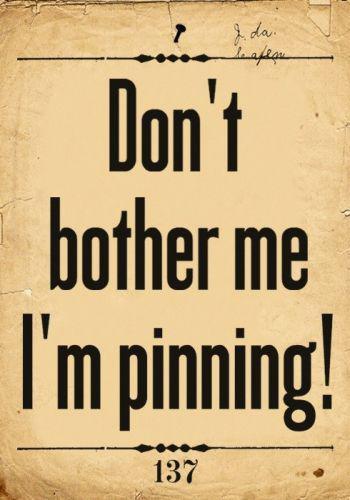I wrote about how much I like(d) using Pinterest just last week in Pinterest for Teaching. About how excited I was about its potential for sharing resources and even professional development, of a sorts. It’s so exciting, it’s almost addictive.
And then 2 things happened, maybe 3.
- I had a conversation with some people at work.
- I read this article.
- I realized how clumsy the service is.

- I recently started working as a tech integration consultant at a school board with two adult education centres and one of the things I did in preparing myself to begin last week was to start collecting resources about adult learning. I began a little blog (soon to be moved to the school board’s servers) and I started pinning, inspired by other educators who were pinning collections of resources on their own pinterest accounts.
I told our technology director about this and his reaction to it all was that was all fine and good BUT. And the but had to do with preservation of information.
Pinterest is a neat way of collecting resources, there’s no getting around that. It harkens back to my high school bedroom wall, which was covered in pictures torn out of magazines, quotes I loved from the books I read, and posters from the albums I listened to. That bedroom wall was my private sanctuary and pinterest is about sharing those things – at a rapid speed.
The other night pinterest was down, just as I was writing that post I referred to at the top of this one. A major concern that was outlined in this conversation I had with our technology director had to with saving resources on an outside server. What happens when/if they decide to shut it all down, or something horrible happens and their servers crash in a major way. Or. Or. Or.
Part of my job is to share and organize resources for the people at our centre. They need to be able to have access to them without the worries that they may one day disappear. I get that. And when I am putting a lot of energy into a search for resources I want to make sure they are somewhere that can be found in the future.
(one could argue about the transient nature of web-based resources to begin with, that they are all renewable in the sense that they change at a propulsive rate. And that the web search itself is a thinking tool so a collection of resources may not be the holy grail that people are looking for…)
- In The Reason I Just Deleted my Pinterest Account, Jeff Dunn talks about copyright issues and how Pinterest is saving its butt by pushing all consequences to the user. Now, I think this actually makes sense. Pinterest is just a vehicle and users should be aware of stealing images from others but many users aren’t. And no one reads the terms and conditions of registering for online services. They just don’t. So I’m wondering how many people know that they could get sued by Pinterest if anyone comes after Pinterest with a copyright infringement lawsuit.
Even though I think it makes sense, at the same time the very nature of the service Pinterest offers encourages copyright infringement. And that makes this all pretty shifty to me.
(once again, one could argue about copyright and copywrong, about who information really belongs to once it makes its way out of our heads and into the world but in the meantime, copyright infringement lawsuits are very real and costly things.)
- Again, when I was putting together that post I reference at the top of this one about using Pinterest in education I lost a resource and just couldn’t find it again. I had done a search for boards on education, fsl, math, science, literacy, adult ed, learning, etc… and had found one great board of quotes that play with the English language. For some reason I had forgotten to link the reference in my blog post. I had the pinner’s username and I had the name of the board but could not find it by searching on Pinterest. In fact, I had two such cases. One I was able to find with the help of a Google search but the other is still lost in the pinterverse.
That is what I mean about it being a clumsy service. Even if you know exactly where something is you can’t necessarily find it. I guess the secret to that would be to pin and like everything that you think you may want to see again in the future but you don’t always know, do you?
So. Back to the question – to pin or not to pin? I’m starting to lean to the not. Though I really do like the essence of this service, there is starting to be too much that gets in the way of my using it comfortably. At the least, I’m going to begin double saving the education resources I pin. That may become cumbersome in the long run though, however for now I do like the idea of sharing the resources I find with other educators and looking through the ones that they have already found.
What do you think? Do you pin?

